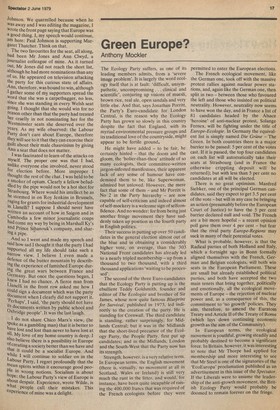Green Europe?
Anthony Mockler
The Ecology Party suffers, as one of its leading members admits, from a 'severe image problem'. It is largely the word ecology itself that is at fault: 'difficult, unsympathetic, uncompromising. . . clinical and scientific', conjuring up visions of muesli, brown rice, real ale, open sandals and very little else. And that, says Jonathan Porritt, the Party's Euro-candidate for London Central, is the reason why the Ecology Party has grown so slowly in this country despite the fact that England, with its myriad environmental pressure groups and its traditional love of the countryside, might appear to be fertile ground.
He might have added — to be fair, he certainly hinted — that the doom and the gloom, the 'holier-than-thou' attitude of so many ecologists, their committee-written jargon-infested manifestoes, their apparent lack of any sense of humour have condemned them to be, like Superwoman, admired but unloved. However, the mere fact that some of them — and Mr Porritt is No 2 in the Party hierarchy — are now capable of self-criticism and indeed almost of self-mockery is a welcome sign of selfconfidence. And no wonder: for from being just another fringe movement they have suddenly taken up position as the fourth party in English politics.
Their success in putting up over 50 candidates in the general election almost out of the blue and in obtaining a considerably higher vote, on average, than the 303 National Front candidates has already led to a nearly tripled membership — up from a thousand to two thousand, with a third thousand applications 'waiting to be processed'.
The second of the three Euro-candidates that the Ecology Party is putting up is the ebullient Teddy Goldsmith, founder and editor of The Ecologist and brother of Sir James, whose now quite famous Blueprint for Survival, published in 1973, led indirectly to the creation of the party. He is standing for Cornwall. The third candidate is standing, rather surprisingly, for Midlands Central; but it was in the Midlands that the short-lived precursor of the Ecology Party, the People Party, first put up candidates; and in the Midlands, London and the South-West that the Party now has its strength. Strength, however, is a very relative term. In European terms, the English movement (there is. virtually, no movement at all in Scotland, Wales or Ireland) is still very much the runt in the litter, and would, for instance, have been quite incapable of raising the 400.000 francs that was required of the French ecologists before they were permitted to enter the European elections.
The French ecological movement, like the German one, took off with the massive protest rallies against nuclear power stations, and, again like the German one, then split in two — between those who favoured the left and those who insisted on political neutrality. However, neutrality now seems to have won the day, and in France a list of 81 candidates headed by the Alsace 'heroine' of anti-nuclear protest, Solange Fernex, will be fighting under the title of Europe-Ecologie. In Germany the equivalent list is simply named Die Griine — The Green. In both countries there is a major barrier to be passed: 5 per cent of the votes cast. If it is passed, the top four candidates on each list will automatically take their seats at Strasbourg (and in France the otherwise crippling deposit will be returned); but with less than 5 per cent no candidates at all will be elected.
There is no great optimism. Manfred Siebker, one of the principal German candidates, said they expect to get 3.5 per cent of the vote — but will in any case be bringing an action (presumably before the European Court of Justice) to have the 5 per cent barrier declared null and void. The French are a bit more hopeful — a recent opinion poll gave them over 4 per cent — but fear that the rival party Europe-Regions may suck in many of their potential votes.
What is probable, however, is that the Radical parties of both Holland and Italy, which a fortnight ago in Bonn formally aligned themselves with the French. German and Belgian ecologists, will both win seats in the European Parliament. These are small but already established political parties, and both have accepted the two main tenets that bring together, politically and emotionally, all the ecological movements of Europe — the rejection of nuclear power and, as a consequence of this, the commitment to `no growth' policies. They aim, therefore, to amend the Euratom Treaty and Article II of the Treaty of Rome (which lays down continuing economic growth as the aim of the Community).
In European terms, the ecological movement is youthful, growing steadily and probably destined to become a significant force. In Britain. however, it was interesting' to note that Mr Thorpe had applied for membership and more interesting to see that Mr Steel is one of the signatories of the 'EcoEuropa' proclamation published as an advertisement in this issue of the Spectator. If the Liberals were to assume the leadership of the anti-growth movement. the British Ecology Party would probably be doomed to remain forever on the fringe.






































 Previous page
Previous page